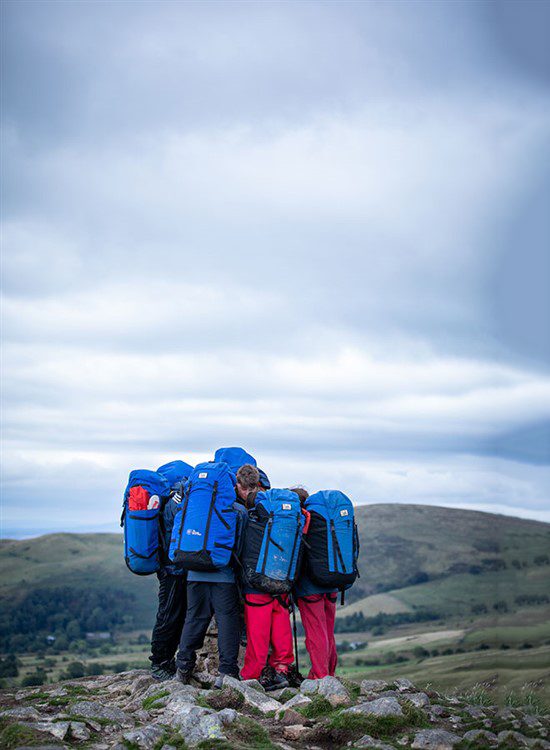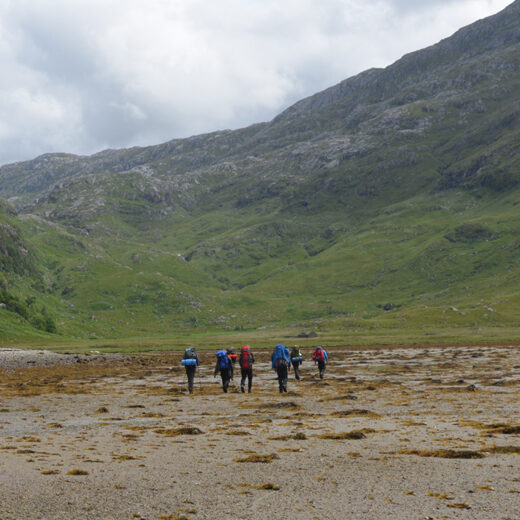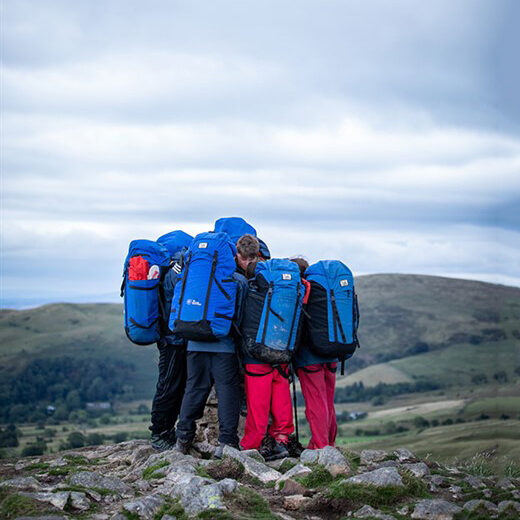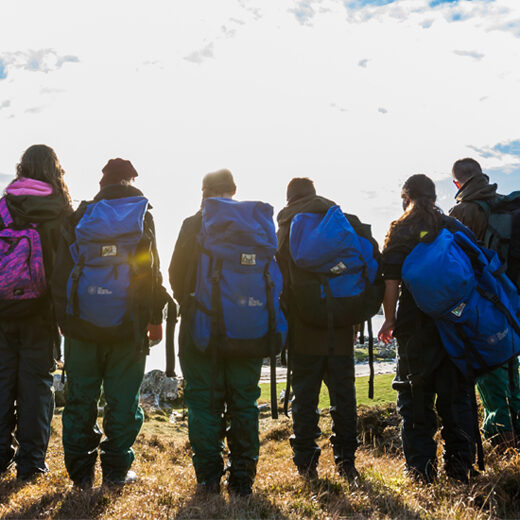Maths and Mountains
Andrew Williams shares his belief in the benefits of outdoor learning and explains how it can work in the context of an inner-city comprehensive.
I'm going to put my cards on the table straight away; I am as passionate about learning in the outdoors as I am in helping pupils reach their full potential, and I am convinced the two are connected.
Great Barr Academy in Birmingham, where I am deputy head, has over 1,800 pupils aged 11-18. Founded in the 1940s as a Secondary Modern, it has evolved to become a Specialist Science School. Our school community is very mixed, with over 50% of our pupils from an ethnic minority background, while 50% attract the Pupil Premium.
We also have a fair number of children with SEN, whether physical, social or emotional. Our school includes many settled families alongside a somewhat transient population, with economic migrants and low-income families living in the area. Our Inclusion Support Unit houses a core of 30-50 pupils, many of whom are from extremely challenging circumstances, including some on Child Protection Plans.
This diversity means we have a really vibrant school culture, but our environment also brings challenges. We are committed to seeking out innovative classroom methods that engage our pupils and heighten the quality of their experience, whatever their circumstances or background. For behavioural and attendance issues, we focus on extracurricular activities which we use as reward and motivation. Similarly, our interventions include engagement and skills sessions for parents, so that they can gain the confidence to help their children succeed.
IF TEACHERS ARE MOTIVATED, PASSIONATE, AND DRIVEN TO GET THE BEST OUT OF THEIR PUPILS, IT HAS A POSITIVE IMPACT ON LEARNING. WE HAVE LEARNT THAT HARNESSING THE ENERGY OF STAFF WHO FEEL VALUED, SIMPLY MEANS THAT PUPILS FEED OFF THEIR ENTHUSIASM. PASSION IS INFECTIOUS AND THE PUPILS JUST SOAK IT UP.

I am a native of Birmingham with a background in science, ecology and maths. I've always had a passionate interest in outdoor pursuits like climbing and trekking, and the sense of well-being from such activities made me think about how our pupils could benefit from time away from the city and learning in natural surroundings.
For many years, I have visited an outdoor education centre in Wales called Ogwen Cottage. Owned by Birmingham City Council, it came under threat of closure due to budget cuts and I helped set up The Ogwen Cottage Foundation to help save it. It is now owned by the National Trust working in partnership with The Outward-Bound Trust and it pleases me to see this fantastic place being used again to enable inner city children to experience all that the beautiful location has to offer.
Most teachers are aware of the now well documented benefits of education in the outdoors. We wanted to find ways of adding value to any experience outside the classroom by linking it firmly to the curriculum. In other words, finding ways to teach the core subjects - especially maths, science and literacy - outside school in a meaningful, enjoyable and most of all, beneficial way. For the last two years, we have been taking children to Ogwen Cottage to undertake Outward Bound residential programmes. These are bespoke courses with learning outcomes designed specifically for us. We run them with experienced Outward Bound instructors working alongside our teachers and pupils. Because of bursaries and scholarships, pupils can attend the courses irrespective of their financial circumstances.
We tend to have good attainment levels in the sciences, but maths attainment has gone up and down. Despite the large amount of teaching time devoted to the subject in the classroom, one third of children don't get a pass at C or above at GCSE and have to re-take. This kind of experience is dispiriting; many pupils end up feeling negative and believing they can't succeed. Given that most class work in maths is exam-focused, we wanted to think outside the box and build in another way to intervene creatively in order to unpick that negative and damaging mindset.
So, we used the mountains to teach maths - in fact, there is a natural connection between mountain climbing and mathematical thinking, in as much as the process itself is important. Children learn that before you get to the 'right answer', you must make progress with gradual steps. The Outward Bound programme teaches our pupils resilience: the idea that half way up a mountain, giving up at the first hurdle is not an option.
Rather, team work, planning, problem-solving and communication erode the feeling of isolation often experienced in traditional maths learning. You get to understand that if you are roped up to others you need to be sure of your calculations, but also that you are on a journey that is going to stretch and test you. The maths teaching is embedded in every aspect of being on the mountain from measuring calorie intake to working out how long it will take to climb the mountain, taking into account ascent, speed and distance.
We saw great results when we put together a group of sports science A-level pupils with some of our most disadvantaged SEN children on a cross curricular adventure residential programme. Some of the latter had become very disaffected and withdrawn, a contrast to the high-achievers. The A-level students acted as mentors for the 'nurture' group and we observed a curious paradox with this combination of children. The most confident kids were often the ones that stuck close to the teachers' sides, while the quieter, less confident ones somehow found their niche, coming out of their shells in a way we wouldn't have anticipated. The usual pecking order of school can change quickly in a mountain environment.
THE MOST CONFIDENT KIDS WERE OFTEN THE ONES THAT STUCK CLOSE TO THE TEACHERS' SIDES, WHILE THE QUIETER, LESS CONFIDENT ONES SOMEHOW FOUND THEIR NICHE, COMING OUT OF THEIR SHELLS IN A WAY WE WOULDN'T HAVE ANTICIPATED. THE USUAL PECKING ORDER OF SCHOOL CAN CHANGE QUICKLY IN A MOUNTAIN ENVIRONMENT.
And again, subject teaching was woven seamlessly into the practical activities, providing a sense of personal investment for the pupils, a sense of accomplishment and a desire to learn more that came back to the classroom. The experience of success is important, for teachers and pupils alike. We speak a lot about benefits to kids but I believe there are huge advantages for staff too. If teachers are motivated, passionate, and driven to get the best out of their pupils, it has a positive impact on learning. We have learnt that harnessing the energy of staff who feel valued, simply means that pupils feed off their enthusiasm. Passion is infectious and the pupils just soak it up. For me, and for Great Barr, outdoor education is the key to really making a positive difference.
If you would like to find more information about our education courses please visit our schools and colleges page or contact us
This article originally featured in the January issue of Teach Secondary and can be found on their website.
Further Reading

Braes High School: The highlands is the ...
2 January 19
Head Teacher explains her personal belief in the impact of outdoor learning.

More of this please: new research to foc...
18 February 19
New research to focus on young people's mental health and wellbeing.

Should GCSEs be scrapped?
11 February 19
No other European country tests young people at 16, so why do we?